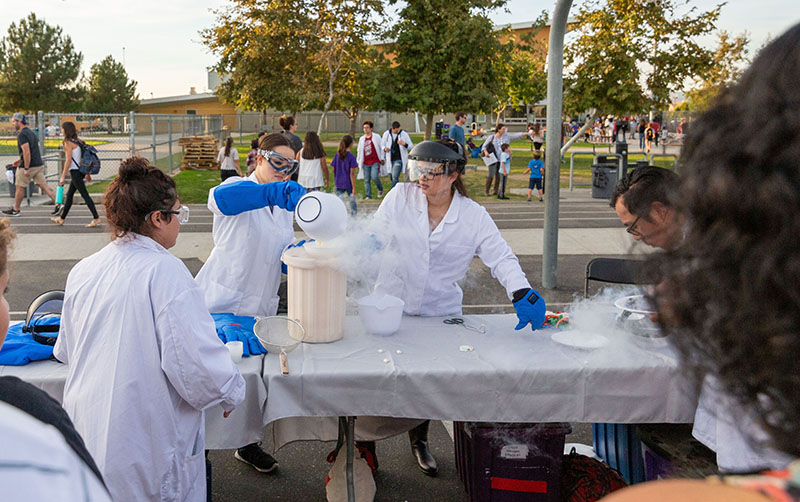 Aug. 31, 2020 —When the U.S. Department of Education first awarded CSU Channel Islands (CSUCI) a five-year $6 million grant to launch Project PROMESAS (Pathways with Regional Outreach and Mathematics Excellence for Student Achievement in STEM) in the 2016/17 academic year, no one could foresee what would happen in 2020/21— the last year of the grant.
Aug. 31, 2020 —When the U.S. Department of Education first awarded CSU Channel Islands (CSUCI) a five-year $6 million grant to launch Project PROMESAS (Pathways with Regional Outreach and Mathematics Excellence for Student Achievement in STEM) in the 2016/17 academic year, no one could foresee what would happen in 2020/21— the last year of the grant.
CSUCI this year received the final installment of a $1.2 million grant for Project PROMESAS, a multi-pronged project designed to improve the academic success of students who are not well-represented in STEM (science technology, engineering, math), such as low income and Latinx students.
What a year it turned out to be.
With little notice, the COVID pandemic compelled Project PROMESAS to go virtual with high school outreach, tutoring, faculty development and the very successful brick and mortar STEM center on campus, which logged 3,449 visits during the 2018-2019 academic year alone.
According to one of the authors of the original grant, Professor of Mathematics Cynthia Wyels, Ph.D, the programs moved online without a hitch, thanks to hard work from all involved. Wyels is involved in the STEM Service Courses (SSC) initiative of the program, in which faculty from Moorpark, Oxnard, and Ventura colleges together with CSUCI faculty collaborate to reimagine critical gateway courses to a STEM major: Pre-Calculus; Calculus I and Calculus II.
“The SSC didn’t really miss a beat,” said Wyels. “We had already built a strong faculty learning community across multiple math departments here and at all three community colleges. They transitioned to virtual learning and carried on with our planned activities and more. They are also leading the way in the transition to virtual in their home math departments.”
To date, 10 CSUCI faculty and 28 community college faculty from the three community colleges in Ventura County have completed 8,860 hours of professional development (training) aimed at supporting students who are learning the calculus gateway courses.
“Dr. Wyels has done a fantastic job of engaging faculty from CSUCI,” said PROMESAS Project Director Araceli Espinoza-Wade, Ph.D. “We know that calculus can be a roadblock, and regardless of the STEM major, you have to pass calculus. The faculty work to make the courses engaging and developing a sense of community and a safe and nurturing environment. To get the students engaged in class, you have to meet them where they are.”
Espinoza-Wade credits Associate Vice Provost for Student Success & Community Engagement Amanda Quintero, Ph.D., with the fact that the various PROMESAS programs were ready to go virtual when they had to.
“Dr. Quintero had enough foresight to see early on that the pandemic might require us to all go online,” Espinoza-Wade said. “She told her management team ‘get ready, because this is going to get worse,’ and I was able to tell my team to come up with a contingency plan.”
Quintero, along with Professor of Chemistry Phil Hampton, Ph.D. were on the original team that procured the grant in 2016. PROMESAS also helped fund the annual Science Carnival, which was organized by Hampton.
An important part of the PROMESAS grant was to help STEM majors at CSUCI stay on track and graduate on time, which was where the STEM Center played an integral role. With training, coordinators were able to get 15+ tutors up to speed on how to use the various Zoom functions by the time the campus went virtual, so tutoring continued, uninterrupted, and will continue virtually through the fall 2020 semester.
For the past three years, PROMESAS has funded a STEM Club for STEM enthusiasts at Channel Islands High School and Hueneme High School. STEM Club members all had an eye on pursuing a STEM career in college, so mentors — CSUCI undergraduate students — would visit the high schools and lead activities to fuel the students’ enthusiasm about STEM.
“They would also get what we refer to as ‘college knowledge,’” Espinoza-Wade said. “Our mentors would do presentations on the difference between a four-year and two-year degree, for example, and scholarships. With COVID coming, we wanted to continue that partnership, and we were fortunate in that the district was excited and willing to work with us.”
Beginning in October, the STEM Club will meet in a virtual environment for 2 ½ hours and Outreach Mentors will lead a STEM activity or have a STEM professional speak to the high school students. The “College Knowledge” presentations will also continue in Google Classroom, Espinoza-Wade said.
The tutors and mentors are adjusting to using a camera instead of a room, which has been a challenge for some, she said.
“They are beginning to understand that this is not business as usual,” Espinoza-Wade said. “We tell them, just show up and be your dynamic self!”
To learn more about Project PROMESAS, visit: https://www.csuci.edu/promesas/.
